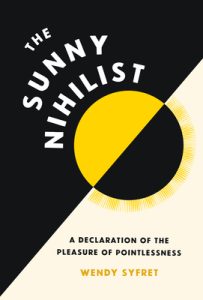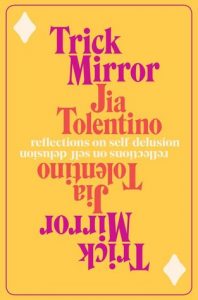Nihilism has a pretty bad rep, and it’s not too hard to see why, but in The Sunny Nihilist, author Wendy Syfret points out the ways in which nihilism, interpreted and applied correctly*, could actually offer a helping hand when you’re feeling overwhelmed with no way out of this hamster wheel of a world (whoever is not feeling overwhelmed at the moment, please spill your secrets. Asking for a friend).
In a way, this wasn’t anything new to me. As in this Guardian article by Syfret, which I believe has been adapted into the book, “Then it hit me: “Who cares? One day I’ll be dead and no one will remember me anyway.” (Syfret, Sunny Nihlism). When feeling as though I’ve spent too long screaming into the void, there’s immense solace to be found thinking about the way in which, if I were to keel over right now, in the grand scheme of things, it’d be ok. The thought of how I’d like my corpse to be dealt with also brings me joy, and the knowledge that even though it doesn’t always feel like it, I’m choosing to continue being alive moment to moment is another thing that lets me take a deeper breath**. It’s not always a guaranteed relief to think of death and the meaninglessness of my own existence, but suffice it to say that I was quite relieved upon reading The Sunny Nihilist that I am not alone in finding it relaxing to do so!
Does all this seem to reflect the nihilism found on social media coming out of millennial and Gen Z output a little too much? I mean, maybe. I’m a millennial who went through art school, so perhaps I’m a little too much the ideal candidate for nihilism to take root in (though as previously discussed, Sartre was my philosopher crush back in the day), but when you think about the coming of age of millennials and Gen Z both, is it really any surprise nihilism seems to be a common touchpoint? (Is there some bias in this absolutely anecdotal gathering of data on my end? Most definitely. If anyone has noticed differently, feel free to share.) On a related note, this one was a bit of news to me since I hadn’t really noticed too much of this on my feeds, but apparently requests for celebrities to enact murder upon oneself are common, which, if you’ve been on the internet, is both surprising but also not really? Of course, Syfret doesn’t turn away from the dark recesses nihilism has also landed people into, and discusses how the very same philosophy can lead you down very different paths – but that in theory, one could harness it for the good!***
*Are there ways to wrongly interpret & apply any philosophy? Can any interpretation be inherently wrong, per se, or is it just different from what was intended by the author (or is that what we mean when we say an interpretation is wrong)?
**This is what I got out of Sartre’s Roads to Freedom trilogy: we are condemned to be free. I didn’t say I don’t question my choices.
***What is the Good? This isn’t that discussion.
This actually leads me to something else I’ve been wanting to write about for a while, but wasn’t really sure how to write about: the self-care industry. I think Jia Tolentino tackles this in Trick Mirror, and there’s been lots written about how the commodification of self care (and the shift in focus from a community effort to an individual one) has taken it away from Audre Lorde’s view of it as “an act of political warfare”, which kind of coincides also with one of Tolentino’s essays (I believe it was – don’t quote me on this one as I don’t have the book in front of me to verify) in Trick Mirror about how things that are targeted at women start to lose their value by dint of that very association. There’s not much more I can say about it, to be honest, that hasn’t already been said before (not that I think anything I have to say in these posts hasn’t been said before), but even as we realize that the self-care industry as a whole – I’m not saying individual companies/brands might not actually care, or that they might not have our best interests in mind when creating a new product! – is, in a way, broken, it’s pretty difficult to walk away from it. Don’t I want to believe that this new hyaluronic acid will be what makes me get a better start to the day? But when it comes down to it, what’s giving me temporary joy before I need the next hit of new promise of a better version of the life I’m currently living isn’t particularly limited to self-care products so much as part of the more general range encompassed by retail therapy. (Which might possibly actually have its place (until it doesn’t)?) And if that’s the case, what I’m getting out of these self-care products isn’t the self-care aspect of it so much as the bolt of joy that purchasing anything else that would’ve promised to improve my life would have. What does it say about us when even the self-care industry can’t escape capitalism? Perhaps more importantly, what does this all even matter?


Karen, I think the Nihilists have a bad rep for cutting off Bunny’s toe – or maybe someone else’s toe and pretending it was Bunny’s?
LOL I had to search that one up because I’d forgotten about it! What a movie – I think it’s time for a rewatch.
I just read through Shunryu Suzuki’s “Zen Mind, Beginner’s Mind” the other day and this post is reminding me of his main tenet that nothing matters, and the acceptance of this truth is one of the paths to enlightenment (obviously I’m simplifying a lot but you get it). Something very comforting about that. I am also a millennial with an arts background so maybe we are extra susceptible to that, but I do think there’s something to be said about the historical response to societal trauma (for example, the Dada art movement that kicked off during WWI and how memes have become the new Dada). People seem to either cling to religion/spirituality or embrace the void lol.
I am all too familiar with the “hit me with a truck” attitude of Gen Z towards their faves and I find myself mimicking it sometimes (I think it’s a hilarious way of expressing heightened emotion – sort of like wanting to squish something that’s cute). I am also SUPER DUPER prone to retail therapy (my response to a rough day is to buy clothes, and I know this) despite knowing that it’s a temporary fix. I’m not sure how to get out of that rut. Because I’m a sucker for things that feel good in the moment and I have no self control lmao (hence why I’m reading Buddhist texts – trying to do things mindfully). But if nothing matters anyway, maybe just giving into the pleasure impulse is okay?? Everything is terrible anyway, what’s wrong with a little joy?? Anyway, sorry for the ramble, I have a lot of thoughts in no coherent order lol. But I think I’m going to pick up a copy of Sunny Nihilism!
I also do this thing in cycles where I’ll read mindfulness texts and find comfort in them for a while, but then fail to actually live them out (hence the cycles). That’s true about the Dada movement & the current proliferation of memes! Though let’s be real: what generation hasn’t seen societal trauma?
Retail therapy is my jam also (as I think you are somewhat aware lol though the focus for me kind of changes from food to clothing and back every once in a while): if I ever see you wearing a lot of new clothing, I’ll be sure to ask if everything’s ok 🙂